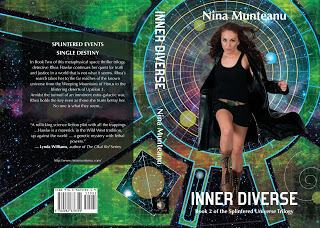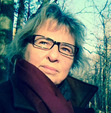Nina Munteanu's Blog, page 12
January 19, 2013
Inner Diverse, Book 2 of The Splintered Universe NOW in Bookstores!
Published on January 19, 2013 07:42
January 3, 2013
January 1, 2013
Wake Up Your Muse: How My Cat Taught Me the Art of Being
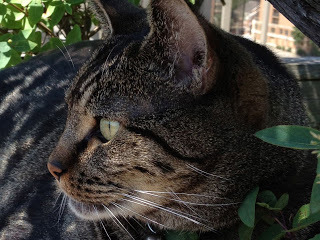
Sammy enjoying the rooftop garden
I’m not a very patient person--ask my publisher. I make no time for writer’s
block or lingering in useless limbo over some plot issue or misbehaving minor
character. I write pretty much to a tight schedule: this short story to that
market by this date; edits to this book to the editor by that date; blog posts
created by such and such a time; an article to another market by another date.
It goes on and on. When I go to my computer to write, I write.
Then there’s Sammy. My cat.
Who likes to jump on my lap, make himself all comfortable
and then lie over my arm — trapping it along with five of my typing digits. Now
what??? Some of you would advise me to simply pull out my pinned arm and/or
shove him off. But how can I disturb
such a blissful creature? He is so content furled on me, so satisfied that he
has captured that wandering appendage of business that is all his now. Content
in the bliss of now.
Pinned in the moment, my mind first struggles with the need
to pound out the next line. My mind then rephrases and teases out nuances of
that line. Finally, it wanders out with my gaze and I find myself daydreaming
in a kind of trance. It is here that
magic happens. In the being; not in the doing.
This is the irony of writing and the muse. To write we need
to live; we need to have something to write about and we need to be in that
state of mind that allows us to set it to print. I am at my best as a writer
when I am focused on the essence of the story, its heart and soul beating
through me with a life of its own.
My cat Sammy isn’t the only vehicle to my magical muses.
Waking up the Muse
Here are a few things that help me entice those
capricious muses into action:
Music: music
moves me in inexplicable ways. I use music to inspire my “muse”. Every book I
write has its thematic music, which I play while I write and when I drive to
and from work (where I do my best plot/theme thinking). I even go so far as to
have a musical theme for each character.
Walks: going
for a walk, particularly in a natural environment, uncluttered with human-made
distractions, also unclutters the mind and soul. It grounds you back to the
simplicity of life, a good place to start.
Cycling: one of
my favorite ways to clear my mind is to cycle (I think any form of exercise
would suffice); just getting your heart rate up and pumping those endorphins
through you soothes the soul and unleashes the brain to freely run the field.
Attend
writer’s functions: go to the library and listen to a writer read from
her work. You never know how it might inspire you. Browse the bookshelves of
the library or bookstore. Attend a
writer’s convention or conference.
Visit
an art gallery, go to a movie: art of any kind can inspire
creativity. Fine art is open to interpretation and can provoke your mind in
ways you hadn’t thought before. If you go with an appreciative friend and
discuss what you’ve seen you add another element to the experience.
Go on a
trip with a friend: tour the city or, better yet, take a road trip
with a good friend or alone (if you are comfortable with it). I find that
travelling is a great way to help me focus outward, forget myself, and open my
mind and soul to adventure and learning something new. Road trips are
metaphoric journeys of the soul.
Form a
writer’s group: sharing ideas with people of like mind (or not,
but of respectful mind) can both inspire you and provide the seeds of ideas.
Published on January 01, 2013 20:18
December 24, 2012
Beat the Christmas Frenzy and Find Your Focus
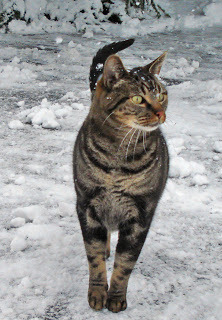
Sammy in his element
How many of you are still running around preparing for the
Christmas celebration or secular family festivity? Buying that last minute gift
you’d forgotten or were chasing down since a bazillion days ago? Or making last
minute changes to your travel plans, house-cleaning for guests, mailing of
cards or parcels or meal preparations?
Well, you’re reading this blog post … That means you’re
sitting down and taking a minute to relax and regroup. That’s good. Remember to
breathe… while I tell you a story…
I’d just finished a three-day drive through snow and rain
storms from Mahone Bay, Nova Scotia, to Toronto, Ontario, where I’m staying for
two days before catching a flight to Vancouver to spend Christmas with my son
and good friends on the west coast. Talk about fast living.
I move around a lot these days. It helps me to appreciate
some of the most simple things in life and reminds me of what I love most about
Christmas: how it focuses my heart and reconnects me. I don’t mean just with
relatives and friends either, although the season certainly does that. I’m
talking about my soul and the universe itself.
Before I became an itinerant, Christmas bustled with my responsibilities
as primary caregiver, social coordinator and hostess of major parties. After I’d
said goodbye to our visiting friends and done the dishes and tidied the house,
after my husband and son had gone to bed, I sat in the dark living room lit
only with the Christmas Tree lights and the flickering candle, and listened to soft Christmas music.
My male cat found his rightful place on my lap and settled there, pinning me
down with love. And there, as I breathed in the scent of wax and fir, I found
myself again.

Most of us think of Christmas as a busy time, of getting
together (often dutifully) with family and friends, exchanging presents and
feasting. Christmas is certainly this, but that is only a shallow view of a far
deeper event; and I don’t mean only for Christians.
Whether celebrating the holy light of Hannukah or the birth
of Jesus, or the winter solstice, this season provides us with the opportunity
to meditate on far more than the surficial nature of the symbols we have come
to associate with the season: the Christmas tree, presents, turkey dinner,
Santa Claus or Saint Nicholas—most of which originate from pagan tradition, by
the way.
Says Lama Christie McNally (author of The Tibetan Book of Meditation), “once you dive below the surface,
you will discover a beautiful clear place—like a diamond hidden beneath the
rubble. It is your own mind, uncovered … Tibetans say we have only just begun
the process of awakening—that we still have quite a way to go in our
evolutionary process. And it has nothing to do with building spaceships or
computers. The next step in our evolution takes place within.”

Christmas is, more than anything, a time of embracing
paradox. It is an opportunity to still oneself amid the bustle; to find joy in duty; to give of one’s
precious time when others have none, to embrace selflessness when surrounded by
promoted selfishness, and to be genuine in a commercial and dishonest world.
If
one were to look beyond the rhetoric and imposed tradition, the Christmas
season represents a time of focus, a time to reflect on one’s genuine nature
and altruistic destiny. A time to reconnect with the harmony and balance in our
lives.
A time to sit with our cat, pinned with love, and write our next novel.
Published on December 24, 2012 15:38
December 15, 2012
Inner Diverse by Nina Munteanu released by Starfire
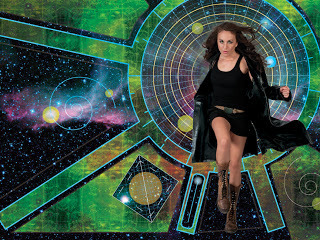
Full cover art for "Inner Diverse" Book 2 of trilogy
Book Two of Nina Munteanu's Splintered Universe Trilogy , "Inner Diverse" was released today by Starfire World Syndicate with cover art done by Costi Gurgu.
In Book Two of this metaphysical space thriller trilogy, detective Rhea Hawke continues her quest for truth and justice in a world that is not what it seems. Rhea's relentless search takes her to the far reaches of the known universe from the treacherous Boiling Seas of the Weeping Mountains of Horus to the blistering deserts of Upsilon 3. Amidst the turmoil of an imminent extra-galactic war, Rhea holds the key even as those she trusts betray her. No one is what they seem in this fast paced second of three books.
“Nina Munteanu is not only a master of metaphor, she is a creator of fantastic worlds and cultures. She combines her biological background with the infinite possibilities of the cosmos and turns an adventure story into a wonderland of alien rabbit holes. When the action starts it goes into hyper-drive, and her protagonist, Rhea Hawke, is a fresh and multi-faceted heroine. A fascinating and enthralling read.”— Craig H. Bowlsby, author of Horth in Killing Reach and creator of Commander’s Log.
“Hawke is a maverick in the Wild West tradition, up against the world; and a genetic mystery with lethal powers. As always, Munteanu sticks to science in her storytelling, and clips along a brisk pace.”—Lynda Williams, author of the Okal Rel series.
"Am supposed to be recording some pick ups today and working on some accents for three of the audiobooks I'm finishing up but instead I get myself sucked into book two of Nina Munteanu's Splintered Universe trilogy!"—Dawn Harvey, voice artist.
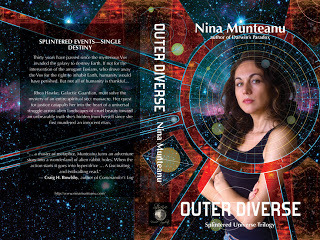
Full cover art for "Outer Diverse" Book 1 of trilogy
For more on Costi Gurgu, the impeccable artist of the Splintered Universe Trilogy , see my previous interview with him here on The Alien Next Door. Costi was nominated as a finalist the Aurora Prix Award, Canada's top award for works in the genre of the fantastic, in the category of Best Artist for his work on Book 1 of the trilogy, Outer Diverse .
Published on December 15, 2012 11:46
December 7, 2012
Nina Munteanu Interview on Speculating Canada
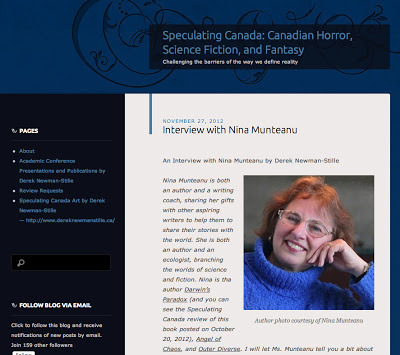
What does science fiction and ecology have in common? And what can they do together for humanity and the planet?
Derek Newman-Stille of Speculating Canada challenges author and ecologist Nina Munteanu with awesome questions on the nature of speculative fiction and the literature of the strange and fantastic.
On the topic of who exactly is Nina Munteanu: "I'm a bit of a bohemian and enjoy wandering the world in search of the strange and wonderful."
On the topic of curiosity's role in creating a better future: "Curiosity feeds our souls. It slows us down so we can pay attention. It teaches us to be interested in the world, to observe and feel. It helps us crawl outside the box, peer around corners into dark alleys where thrilling adventure lurks."
On the role of SF: "the literature of the fantastic: speculative literature, science fiction, fantasy...explore--nay--celebrate and bridge the gap between logic and imagination, the mundane and the extraordinary, the known and the strange, order and infinite possibility.
On the role of speculative fiction: "Speculative fiction predicts consequence to current conditions. It projects into the future or alternate reality from current paradigms in science, technology, and society. Speculative fiction uses the premise, "What if?": "What if this continued?"; "What if we used that this way?"; "What if this caused that?" It provides the proverbial canary in the mine on society. Speculative fiction doesn't just 'tell us'; it can 'show us'."
About balancing her science and her fiction: "My fiction and my ecology have co-evolved in a synergistic way. My interest in ecology stems from my interest in preserving this planet as well as my fascination for how Gaia works; these themes pervade most of my fiction and much of my non-fiction articles and essays...Both ecology and science fiction explore consequence in a big way."
On how these two pursuits influence the other: "Writing science fiction has opened the doors of creative problem solving in my scientific pursuits; and my science has opened windows of possibilities in my writing."
On the role of SF in raising environmental awareness: "Science fiction is the literature of consequence that explores large issues faced by humankind; it can provide and important vehicle in raising environmental awareness."
On her interest in the outsider, as featured in Darwin's Paradox and The Splintered Universe Trilogy: "I find the concept of the outsider fascinating from a psychological perspective. How we treat the unknown (e.g., with suspicion and fear or with wonder and curiosity) tells so much about who and what we are."
On the role of media in influencing what society considers socially desirable or the biases that develop: "We are a fickle, multiplexing culture who want it now, fast, easily digestible--and already summarized. Letting others decide for you what is newsworthy is so dangerous; it spawns gossip and feeds into propaganda."
On the influence of her Canadian identity in the worlds she creates: "Canada is a truly multi-cultural country and serves an excellent fractal microcosm for writing about mixed civilizations in the universe."
For the complete interview go to Speculating Canada.
Published on December 07, 2012 00:06
What does science fiction and ecology have in common? A...

What does science fiction and ecology have in common? And what can they do together for humanity and the planet?
Derek Newman-Still of Speculating Canada challenges author and ecologist Nina Munteanu with awesome questions on the nature of speculative fiction and the literature of the strange and fantastic.
On the topic of who exactly is Nina Munteanu: "I'm a bit of a bohemian and enjoy wandering the world in search of the strange and wonderful."
On the topic of curiosity's role in creating a better future: "Curiosity feeds our souls. It slows us down so we can pay attention. It teaches us to be interested in the world, to observe and feel. It helps us crawl outside the box, peer around corners into dark alleys where thrilling adventure lurks."
On the role of SF: "the literature of the fantastic: speculative literature, science fiction, fantasy...explore--nay--celebrate and bridge the gap between logic and imagination, the mundane and the extraordinary, the known and the strange, order and infinite possibility.
On the role of speculative fiction: "Speculative fiction predicts consequence to current conditions. It projects into the future or alternate reality from current paradigms in science, technology, and society. Speculative fiction uses the premise, "What if?": "What if this continued?"; "What if we used that this way?"; "What if this caused that?" It provides the proverbial canary in the mine on society. Speculative fiction doesn't just 'tell us'; it can 'show us'."
About balancing her science and her fiction: "My fiction and my ecology have co-evolved in a synergistic way. My interest in ecology stems from my interest in preserving this planet as well as my fascination for how Gaia works; these themes pervade most of my fiction and much of my non-fiction articles and essays...Both ecology and science fiction explore consequence in a big way."
On how these two pursuits influence the other: "Writing science fiction has opened the doors of creative problem solving in my scientific pursuits; and my science has opened windows of possibilities in my writing."
On the role of SF in raising environmental awareness: "Science fiction is the literature of consequence that explores large issues faced by humankind; it can provide and important vehicle in raising environmental awareness."
On her interest in the outsider, as featured in Darwin's Paradox and The Splintered Universe Trilogy: "I find the concept of the outsider fascinating from a psychological perspective. How we treat the unknown (e.g., with suspicion and fear or with wonder and curiosity) tells so much about who and what we are."
On the role of media in influencing what society considers socially desirable or the biases that develop: "We are a fickle, multiplexing culture who want it now, fast, easily digestible--and already summarized. Letting others decide for you what is newsworthy is so dangerous; it spawns gossip and feeds into propaganda."
On the influence of her Canadian identity in the worlds she creates: "Canada is a truly multi-cultural country and serves an excellent fractal microcosm for writing about mixed civilizations in the universe."
For the complete interview go to Speculating Canada.
Published on December 07, 2012 00:06
November 14, 2012
2012 World Fantasy Convention in Toronto
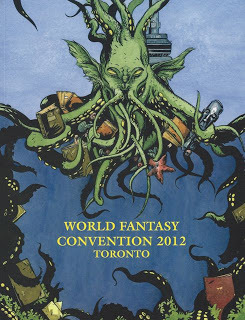
On November 1-4, 2012 I did a
cool thing: I participated in a world event about the fantastic. Since its
inception in 1975 in Providence, Rhode Island, World Fantasy Convention (WFC)
has been held in a different location in the world each year (next year the WFC
will be held in Brighton, UK, returning for the first time to England since
1997 when London hosted the WFC). This year, World Fantasy Convention happened
on my doorstep: Toronto, Canada. Despite being primarily an author of science
fiction, I just had to go. Besides, I’d just released my first fantasy novel
“The Last Summoner” (Starfire),
currently enjoying some popularity in Canada and the United States.
Themes & Other Terribly Wonderful Things
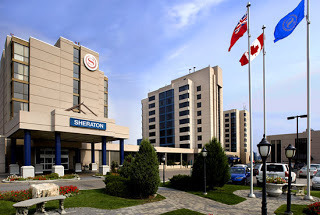
This year Northern Gothic and
Urban Fantasy were featured themes. Special guests included the current deans of
urban and gothic fantasy: Patricia Briggs; Charles de Lint; Larry Dixon; Tanya
Huff; and Mercedes Lackey; with author guest of honour Elizabeth Hand, recipient
of the previous year’s world fantasy award for her novella “The Maiden Flight
of McCauley’s Bellerophon”.
Convention Chair Peter Halasz
and his team of volunteers pulled off another awesome convention. Toastmaster
Gary K. Wolfe officially opened the convention Thursday evening to an
enthusiastic crowd. Events included an art show and auction, the 2012 World
Fantasy Awards and banquet on Sunday to announce and celebrate the winners.
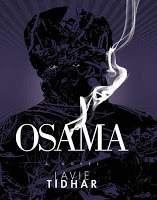
The World Fantasy award for best
novel went to Lavie Tidhar’s “Osama”, published by British small press PS Publishing. Tidhar’s story, said to
stretch the boundaries of the genre, beat out stiff competition from Stephen
King’s “11/22/63”, George RR Martin’s “A Dance With Dragons”, Jo Walton’s
“Among Others” and Christopher Buehiman’s “Those Across the River”. For a full
list of nominees and winners of the 2012 World Fantasy Awards, you can go to
the Tor site.
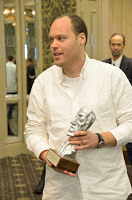
2012 World Fantasy Awards and
Lifetime Achievement winners included Alan Garner and the prolific and
well-loved George R. R. Martin.
The con also hosted an immense
book signing, in which zealous book collectors had a field day. Snaking
line-ups of eager readers with stacks of books under their arms cued for the
likes of Elizabeth Hand, Patricia Briggs, Larry Dixon, Charles de Lint,
Mercedes Lackey, Patrick Rothfuss, Tanya Huff, Guy Gavriel Kay, Jo Walton, Alan
Garner, Joe Haldeman, Robert J. Sawyer, Julie Czerneda, and so many more (too
many to name them all here).
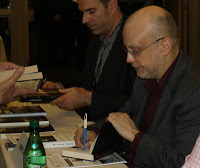
Panels & Other Possibilities
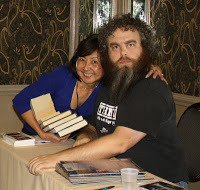
Between important meetings at
the Hotel’s Spirits Lounge and the
nearby Fox & Fiddle drinking
establishment with friends, colleagues, future colleagues and strangers who
would soon be friends, I attended a few choice panels. Panels were wonderfully
diverse and interesting. Subjects included the obvious media topics of Urban
Fantasy and Steampunk but also explored more erudite literary areas such as
editing, self-publishing and the moving target of other publishing
paradigms.
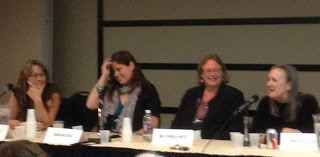
A panel entitled “New Twists on
Accepted Myths” moderated by publisher Virginia O’Dine and made up of authors
Marie Bilodeau, Mercedes Lackey, and anthropologist Meg Turville-Heitz, had me
both laughing and thinking with the lively banter between authors, publisher,
and academic. Panelists happily wandered rich territory from the traditional application
of classical “King Arthur” to the irreverent slanting of Ragnarok.
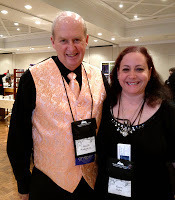
L.E. Modesitt and Karen Dales
Several panels were devoted to
the blur in fiction between reality and the fantastic. In an early morning
session that was mysteriously well-attended, called “Reality Made Fantastic or
Fantastic Made Real”, L.E. Modesitt moderated an eclectic and international
panel of authors, academic and literary agent. He asked panelists Isobelle Carmody, Sally
Harding, Karl Schroeder, Delia Sherman, and Greg Wilson to discuss topics from
world-building, urban settings and characterization to why there is always a
bowl of unrecognizable green dip in the hospitality suite at world fantasy
cons.
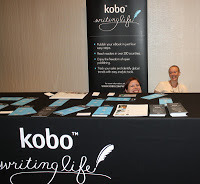
Marie having a "Kobo moment"
Several panels discussed the
changing face of the industry. Panelists including seasoned professional
editors such as Ellen Datlow and Gordon Van Gelder to academics such as Robert
Runté
discussed topics that ranged from the role of the editor to e-publishing and
the rising wave of self-publishing. At some point, discussions naturally slid
to personal gripes about anything from devices like Kobo and Kindle to why you
should love—or hate—Amazon and the alien-wisdom of Apple.
Hospitality & Why I Really Came
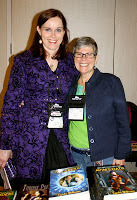
Suzanne Church & Anita Hades
Speaking of the hospitality
suite—well, I was a paragraph ago—the food and drink provided to attending
members was outstanding. The suite, large and cozy with French-style furniture
and tiny tables, became a focal center for foraging nomads. Most times, I had
to pick my way through the snaking line of outstretched legs as parked members
blithely ate and chatted in the hallway. The suite was a microcosm of the
convention, where members met, drank coffee, visited over food and traded
stories from around the world.
It is called a World Fantasy
Convention, after all. I met people from Sweden, the UK, Iceland, Denmark, the
Netherlands, Germany, France, Israel, Australia, USA, and Canada. We discussed
anything from the mysterious green dip and American politics (no connection,
really) to why American writer Suzanne Collins’s “Hunger Games” became so
popular in North America but not so much in Europe and Asia.
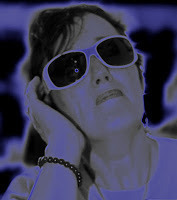
Radio host Winifred H. Smythe
I met old friends I hadn’t seen
since I moved from the west coast to the east coast of Canada and renewed my
contacts with colleagues, editors, publishers and fellow authors.
In a way, the World Fantasy
Convention is really a giant annual business meeting. It is a place and time
for professionals in the realm of the fantastic—authors, publishers, editors,
reviewers and artists—to congregate at an excellent venue and trade ideas,
stories, and history, conduct business, make new contacts, network generally,
and have fun. It is an opportunity for those involved in the world of
speculative, fantasy, and science fiction literature and art to renew,
cross-pollinate and come away changed, vitalized and...well...fantastic.
I traded my business card with
more people than I can remember, discovered some interesting opportunities, and
counted my experience at this year’s world fantasy convention a great success.
I was feeling pretty fantastic.
Next year, Brighton!
Published on November 14, 2012 15:04
November 10, 2012
Julia's Gift by Nina Munteanu
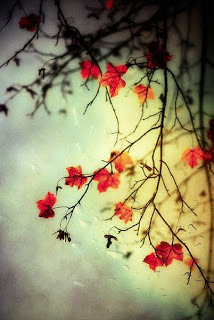
A short while ago, I wrote a piece entitled "Writing about Truth and Other Lies". In it, I explored the notion of “truth”: quintessential divine truth, individual truth, corporate truth and so on. I used the example of the recent controversy over Proposition 37 to label genetically modified products in California. I call it controversy, because a debate is raging on the Internet about the benefit of this action. A debate fed by self-interest, greed, and mendacity. Truth has little to do with it, as far as I’m concerned.
Julia's Gift will soon become one of nine stories in a collection that is coming out early next year with Starfire entitled “Natural Selection”.
Julia’s
Gift
I
inhale deeply to savor the freshness of the air and raise my face to the bright
sun bathing in an azure sky. I begin to climb the stairs, averting my eyes from
the thousands of people watching me. I falter and nearly stumble as my thoughts
sink like a stone in water to Julia and what she did: to that black day
twenty-nine years ago when her actions determined who lived and who died, and
to the day much later when she ended the curse she’d placed on herself as a
result.
Why did she do any of it? Maybe it was
because she was the middle child in our family. Psychologists like to say that
the middle child acts like an immobile bridge between roles of leadership and childish
irresponsibility. Able to see both sides of an argument, they usually make good
diplomats, but falter when faced with spontaneous decisions. Like a fish out of
water forced to breathe air, Julia gulped in leadership against her nature . .
. and destroyed herself.
How different the course of events might have
been if she hadn’t acted so boldly that spring day twenty-nine years ago. Would
I be here, walking up these steps now? Would Simon have survived? Would Julia
still have jumped in front of the tube-jet seventeen years ago? Or would we all
have died along with our parents that spring day?
ϕ
The blood-red dawn promised a warm day in
April. By mid-morning the smell of Montreal had dissipated. The sun felt like a
heat lamp on my face as I stepped outside the farmhouse, scrambling after my
older brother and sister. They were both tall and long of stride, wearing
functional bows and arrows slung over their warrior-like shoulders, while I
trotted behind like their pet dog. I didn’t mind. I was only ten years old and
Simon and Julia were my heroes. They took me on forbidden adventures in the
forest. Our parents didn’t allow us outside the farm property because of the
threat of stray revolutionaries, but Simon and Julia flagrantly disobeyed them.
It probably started on a dare that escalated out of hand. It was as much that
dare as anything else that ended up saving one life, sacrificing another and
damning the third.
We often spent the better part of the day in
the forest and fields beyond the farm property. It was only Simon, who usually
made the decision in the first place to stay all day, who had the presence of
mind to bring along food—which he seldom shared. During our journey Simon would
usually throw a glance back once or twice to make sure I was still keeping up
and rebuke my snail’s pace: “Hey dreamer, hurry up or we’ll leave you behind!”
Julia would snap at him in my defense: “Claire’s only ten, you idiot! So slow
down for the runt!” They would always argue. “Well, you slow down too, then!”
he’d shout back. “I slowed down for you already, slug!” she’d rejoin. On it would
go as they shoved each other until I caught up to them. They were less than a
year apart and I think Julia resented Simon being the eldest and the one who
made all the decisions. She wanted to make them but she never did, so she
always disagreed with his.
The day started pretty much like any other
day. Simon and Julia were arguing as usual by the time we reached the forest.
They’d overheard a discussion between Mom and Tante Lise about the revolution.
We moved to the country last summer to get
away from the fighting in Montreal. Mom and Dad lost their jobs because of the
Gaian revolution. The company they worked for, BioGen Technologies, went up in
smoke thanks to the latest rash of fire bombings and Mom got scared that the
Gaians would come after the survivors — mainly Dad, who was one of the head
honchos there. So we packed up and moved to my Oncle Pierre’s and Tante Lise’s
small dairy farm in the Eastern Townships, where the air smelled clean -- well, cleaner than the cities, anyway.
Mom and Dad met at BioGen in Montreal. She
was a junior microbiologist in “functional genomics” with unorthodox ideas, and
he was one of their chief scientists in nano-technology and transgenic
research. BioGen was supposed to save the world, but then one of Dad’s
“creations” got away from them and crashed the world’s wheat crop.
“Tante Lise shouldn’t call Dad Frankenstein,”
Julia grumbled. “He isn’t a monster.”
“It’s ’cause he made monsters, stupid.”
Simon snorted. “Frankenstein’s the name of the mad scientist, not the clone
monsters he made.”
“He’s not a mad scientist,” she defended.
“And they’re not monsters!”
“The Gaians say they are,” Simon quipped,
picking his teeth. “They say that BioGen’s just another multi-national company
that’s making too much money. They say BioGen’s technology is irresponsible and
that stuff Dad did is wrecking our ecosystems like diversity, evolution and
stuff.”
“What do the Gaians know. They’re luddites,”
Julia said with disgust, parroting what our father always said. I knew she
didn’t know what a luddite was. “Dad just made a little mistake once. Some DNA
escaped and went rogue on them. Part of the risk we have to take in GE crops.”
“Yeah, like widespread famine,” Simon
muttered, shaking his head.
Julia frowned with worry. “Tante Lise isn’t a
Gaian . . . is she?”
“Dunno.” Simon shrugged and absently raked
back his mat of straw-coloured hair with his hands. “She doesn’t like what Dad
was doing. Lots of people think it’s wrong. Even Mom.”
“Mom’s just scared they’ll find us,” Julia
grumbled. “She’s scared of everything,” she murmured more to herself than to
Simon, as if trying to convince herself.
As we stepped out of the cool dappled forest
into the warm sunshine of a small clearing, Simon announced that we should eat
some lunch. I was happy to comply.
“It’s only ten-thirty,” Julia objected.
“Well, I’m hungry. So it’s time to eat.”
“You can’t tell me when to eat,” Julia
said tartly. “Pig!”
“That’s because you only brought along some
crackers while I made three sandwiches for me! You’re never prepared,” he said
smugly. “And now you’re jealous!”
“I’m
not jealous,” Julia said haughtily. “I’m just not hungry.”
“You are.”
“Am not!” Her face went pink.
“Are too, dork!” He laughed, then promptly
sat down on a patch of matted long grass and swung out his backpack. Without
waiting for either of us to agree or join him, Simon fished out a peanut butter
and raspberry jam sandwich and bolted it down with gluttonous pleasure as I
longed in silence. He wasn’t a particularly tidy eater and left a smear of red
jam on his chin. I noticed that his cheeks were flushed already from the heat
and sweat glistened on his nose and forehead.
Julia stomped around then finally dropped
down and threw her arms against her upraised knees. She glowered at her older
brother. Even if she was hungry she wasn’t going to admit to it now. I
was ready to confess my hunger in hopes of receiving a morsel, but Julie glared
at me as if she’d read my mind. My shoulders drooped in defeat.
After Simon finished his first course of
lunch, we plunged back into the forest out of the burning sun. The deer flies
buzzed furiously around our heads amid wild arm waving and frustrated outcries.
Simon led us up a hill toward a large hemlock grove. He scrambled a steep
incline to a narrow long ledge that may have once been a path. The forest floor
was carpeted with dead needles and tiny fallen cones and dotted with young
maple saplings. Like a man who had found gold, Simon bent down and gathered a
handful of cones then darted behind a tree. Julia waited for me catch up before
she scrambled up, shrieking at the deluge of cones Simon flung at her face. He
sniggered as she practically fell backwards on top of me. She swore furiously
at him, her face red with embarrassment.
“Come on!” Simon said enthusiastically.
“Let’s play war!”
Eager to play, Julia ran for cover and
gathered her own arsenal of weapons.
“You can’t use your hands!” Simon warned just
as Julia was about to throw some cones at him. “You have to make a slingshot
using a tree like this.” He squatted over a young sapling and bent its branches
into a mutilated mess, fit a cone into his makeshift catapult, pulled the
sapling back than let it spring naturally towards Julia. The cone flew past her
head, barely missing her. Both participants shrieked with pleasure.
As Julia and Simon collected their cones, I, left
out of the game as usual, sat back like a dutiful and appreciative audience to
watch their creative entertainment. The warriors shot in earnest, sometimes
hitting their opponent with a victorious cry, other times -- most of the time -- missing widely. In the process the poor saplings they used were
swiftly demolished and they had to forage for a new catapult. During one of her
forages, Julia tripped on an exposed root and fell headlong to the ground with
a hollow thud. When she didn’t get up right away, Simon jeered, “Hey, clone
monster! Get up!”
She jerked to her feet. She wiped her head
and pushed back her thick mane of chestnut hair, tucking it behind her ears. I
noticed a cut on her dirt-smeared forehead. “Don’t call me that, you moron!”
she said, temper flaring.
“You’re the moron! You never do
anything on your own,” he bit out. “That’s ’cause Dad made you out of spare
parts back at the lab!” That line was usually reserved for me and I was used to
it. But Julia couldn’t bear the insult.
“You shut up!” she screamed. “I’m tired of
your snotty remarks about Dad. You can keep them to yourself --”
“Until he gets us all killed when they come
looking for ‘Doctor Frankenstein’!” Simon mocked.
Julia bolted at him, hands lashing out like
raptor’s talons. He jerked out of her clawing hands and tackled her. They
rolled among the dead leaves, hands swiping and legs kicking. I couldn’t tell
who was winning, but both were crying.
“Stop it! Stop it!” I pleaded and tried to
pry them apart. I finally succeeded but only after receiving a kick in the
stomach.
Simon stood up first, nose bleeding and an
eye already swollen. “You bitch!” he screamed down at her as she pushed herself
off the ground and wiped her dirty tear-stained face. “You crazy bitch! You
don’t care about Mom. You’re just like Dad: he should have thought about us
before he went and made all those monsters!”
“Go to hell!” she shrieked. “You don’t have a
clue what he was doing. He was feeding the hungry of the world!”
“Yeah? Meantime we’re polluting it so much we’re
killing everyone we’re feeding!”
“Can’t we do both?” I piped up. “Like the
plants?”
“What?” They both turned haltingly to me like I was an alien who’d
just uttered gibberish.
“Feed the hungry and clean up the
pollution,” I said. One day while my brother and sister were in school, my father
had pulled me out of class to take me on a tour of the BioGen facility and show
me their artificial photosynthesis lab: “How marvelous,” he’d exulted, “if we
could copy what chloroplasts do and plug directly into the sun without burning
a drop of oil. No more hungry people. No more fossil fuel and no more
pollution.”
He’d dropped me off at my mother’s lab and
she’d shown me holo-images generated through electron tomography of
mitochondria and chloroplasts. While my father had dedicated himself to feeding
the starving masses, my mother dreamed of a world where people no longer needed
to eat. The mitochondria and chloroplasts shared a common ancestry, she
explained to me. They both descended from earlier prokaryotic cells that
established themselves as internal symbionts -- endosymbionts, we now call them -- of a larger anaerobic cell. The similarities between these two
organelles were uncanny, my mother went on: for instance, they both contained
their own DNA and ribosomes; they divided by themselves and used the same
enzyme to produce energy in the form of ATP. The only major difference was how
they produced ATP. While chloroplasts used chlorophyll to capture the sun’s
energy, mitochondria broke down glucose in the food we eat. Inspired by my
father’s tools and my mother’s vision, I soared on a dream of people capable of
photosynthesis in a Ciamician world.
“Dad told me,” my words rushed out in a
torrent, knowing I had seconds before they ignored me again, “about a scientist
named Giacomo Ciamician who a hundred years ago dreamed of a world where
photosynthesis did everything for us--”
Julia took in a sharp breath and turned back
to rail at Simon: “You’re so narrow-minded, just like a Gaian, just like Mom!”
She retrieved her bow, scattered arrows and quiver. “Come on, Claire.” Julia
took my hand with a last glare at Simon, who was brushing off the mess from his
shirt and pants. “We’re going home.” Without waiting for me to decide, she led
me at a brisk pace back to the farm.
“Do that!” Simon yelled after us, and sat
down on a rock to sulk. I turned my head for a last glimpse at him as Julia
tugged me hard down the hill.
“Shouldn’t we wait for him?” I asked
innocently when I lost sight of him.
“He can find his own way home,” she muttered,
tugging me harder. “He led us here, didn’t he?”
I staggered over the rough terrain to keep
up, secretly praying that Julia knew the way. It wasn’t Simon I was worried
about. The sun disappeared behind carbon-coloured clouds. They scudded overhead
like prey, chased by a biting wind. It howled and sent the Trembling Aspens
thrashing above us. Their lanky poles clanked like bones to the moaning wind as
the leaves hissed a mad chorus.
“What if we meet a bear?” I asked, starting
to feel unsafe.
“There aren’t any bears in the forest,
Claire,” Julia said shaking her head sarcastically at me. “Besides, I have my
bow and arrows.” She tapped her quiver and bow smugly. She was right, I
thought, pacified by her confidence. She was good with that thing and I was a
little surprised that she didn’t remind me of the four rabbits and two coyotes
she’d killed while all Simon had managed to do with his was wound a single
rabbit.
We broke through the perimeter of the dense
forest that lined the farm as rain pelted us like missiles, instantly drenching
us. As if the stinging rain had warned her, Julia gripped my arm to stay me. I
saw her eyes harden as she threw swift glances to the open garden gate and the
greenhouse whose door was ajar--
I squeaked in surprise as she clamped a hand
over my mouth. “Shhh! Hold still!” she whispered, glaring at me under streams
of wet hair. Then she let go and I couldn’t stop trembling while she snatched
her bow and loaded it with an arrow. As if in response to her move, the front
door of the farmhouse creaked open and a large unshaven man with unwashed hair
and eyes glinting of malice lumbered out. He carried a loaded sack in one dirty
hand and a blood-covered knife in the other. The man spotted us and I hitched
my breath, stiff with terror, not daring to blink the rain off my eyelashes. He
grinned, baring yellow teeth, and stomped toward us. I scrambled behind Julia and
clutched the leg of her shorts.
Julia glanced from the man’s churlish grin to his knife and raised
her bow. He laughed at her. Without hesitation she drew the bow back and let
the arrow fly. It sunk into his chest and he inhaled sharply, eyes bulging in
disbelief. Then he charged us. I cringed and wet my pants. Julia stood like a
statue, her arm a blur of reloading, and struck him with two or more arrows
before he staggered and fell dead on his face only meters from us.
Gruff laughter from the side of the house
warned us that there were more men. Julia seized my arm and dove for cover in a
small thicket by the cherry tree just as Simon broke through the forest into
the clearing. I shivered, cowering in our wet hiding place as several armed men
marched past us toward the dead man. Toward Simon. Simon stood not far from
their dead colleague, hair hanging in his eyes and bow in his hand. They made
the logical conclusion.
He must have made his own rightful conclusion
and his eyes fleetingly strayed, searching hard, beyond the thugs to where we
huddled behind them. Did he see us there? I imagined that he did. But before I
could see more, Julia shoved my face down into the dirt. What I didn’t see I
could only imagine as my heart slammed up my throat: Simon’s and Julia’s eyes
locking, their anguished message of agreement. The rest I heard through the
hissing rain: a slashing sound, a clipped gasp and a thud. I was choking but
didn’t dare struggle. Hot tears stung my eyes. Julia’s firm hand, now shaking,
kept me down for an eternity of smelling dirt and rotting vegetation. Of
feeling the wet prickle of soil and leaves against my face. Of listening to
men’s grunts and shuffling steps dwindle to a constant sizzle and plopping of
rain.
I was young, but I knew perfectly well what
had just happened: Simon took the hit for us, and Julia let him. The first -- and
last -- decision they’d made together was one made in complicity.
ϕ
Julia and I made it out of there, after she
confirmed that Simon was dead and found our parents and relatives murdered
inside the house. We had a difficult journey but were eventually taken in by a
kind family, where we rode out the remaining years of war until the Gaians
established a new government and peace was reinstated.
I found a calling in micro-biomimicry -- the Gaian’s answer to aimless technology -- at Concordia University in Montreal. Julia
never returned to school. She got a job as a waitress and helped me through
university. I met André, a med student, and eventually married while Julia
wandered like a nomad from one relationship to another. We saw less and less of
one another, until I started to think she was avoiding me. When she committed
suicide I was shocked. But not surprised.
Had she been running the same thought loop I
had? How it might have played if she hadn’t killed that Gaian and run instead.
Had she needlessly killed a man -- albeit a murderer -- and needlessly caused Simon’s death? If we’d run instead would
they have chased us or let us go? They were paid assassins, after all, on a
mission to ‘take out’ our father. Not child murderers. Maybe Simon would still
be with us and Julia wouldn’t have destroyed herself out of irreconcilable
guilt for her inaction in Simon’s murder—on account of her initial violence—to
save the two of us. . . .
Or had she tapped into some divine providence
when she let the arrow fly and saved my life the only way it could have been
saved . . . at Simon’s expense . . . and consequently her own? . . .
ϕ
I turn to the audience and spot André and our
two children. They blur through my tears. As a scientist I understand that one
cannot know the future or one’s destiny; but my heart tells me differently.
Like most things for him, my brother’s choice was clearly laid before him. For
Julia, as always, it was not so simple. And yet, that spring day she became
more than she was and with fluid motions enacted her part in the cruel miracle
that brought me here today.
The heaviness in my legs lifts as I take the
last steps to the podium in the open-air auditorium that celebrates our clean
air. I am finally ready to accept my Nobel Prize. And I know at last what I am
going to say:
I’m here today accepting this award for the
creation of photosynthetic symbionts in human mitochondria, because of my
brother and sister. I share this honor with
them. If not for their heroism on a day long ago, I would not have survived
with the burning motivation and tenacity to pursue a lifelong dream: to serve
the human race and the planet with the gift of an alternate and clean source of
fuel and food -- a way for humanity to directly harness energy from the sun . . . Julia’s gift.
~ The End ~
Post Script:
As a postscript to the subject of genetic engineering,
which formed the basis for the premise of this short story, I must report that
Proposition 37 (to identify all foods that have been genetically altered), was
defeated through a vote by Californians. I am appalled and dismayed that
otherwise intelligent citizens would choose to vote against their own and
others best interests: the simple right to know a characteristic of their food
product. It's not unlike making the choice between food that was grown a
particular way vs. another (e.g., eco-friendly vs. not, or fish that were
processed in one way vs another). Voting "No" to GE labeling is like
saying "No" to labeling. It's like saying, "I don't want to know
the expiration date of this luncheon meat I'm buying or that it has
peanut-residuals in it that might not affect me but might affect little Billy
down the street."
The FDA has decreed that there's no difference between
genetically engineered and non-engineered plants. That's ridiculous. Of course
they are different: one is engineered and the other isn't. It's that simple.
So, why the great big fight then? Why did those huge companies like Monsanto,
Dupont, Nestle, Coca Cola, Conagra, Kellogg, Dow, Bayer, BASF, Syngenta and
others spend millions to defeat a bill that just asked them to label their
oh-so-not-so-different product??? What are they afraid of?
We could chalk one more for the bullies ... likewise, we could chalk another one for a surrendered freedom ... Or, citizens can choose to learn something from it. And do our own labelling, based on the companies that chose against disclosure.
Here's my verdict and decision: I've chosen NOT to purchase anything by any company that chose against disclosure. Why? I no longer trust them. It's that simple. Thanks for revealing yourselves.
What does this have to do with "Julia's Gift"?
Nothing ... Everything ...
Published on November 10, 2012 17:02
October 31, 2012
Why You Want to Go To A Writer’s Convention
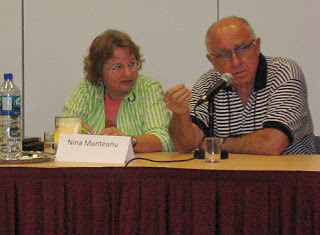
Nina Munteanu and Tom Doherty share a panel on ecology
I'm about to attend (and participate as a panelist and guest
author) tomorrow for four days at the World Fantasy Convention in greater Toronto (The Sheraton Hotel in Richmond Hill). And I’m all
jazzed about it! Why?... Well, let me tell you why…
If you haven’t yet attended a writer’s conference or convention, it’s
high time you did. Because, not only are you missing out on an education, you
are missing out on a sub-culture that may change your life as a writer, help
feed the hungry and align the universe.
The last World Fantasy Convention I attended was several years ago in
2008. It was held in Calgary, Alberta, when I still lived in Vancouver, British
Columbia. The ten-hour drive through some of the most glorious Canadian
wilderness and mountains was bracing and we were lucky that the weather played
fair. It was an auspicious start to a wonderful journey of self-discovery.
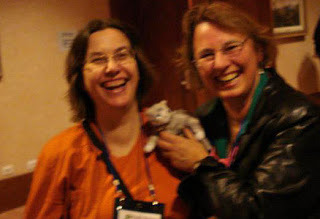
Nina introduces Toulouse to author Lynda Williams
Hosted by toastmaster Tad Williams, this world-class convention
featured guests of honor, David Morrell, Barbara Hambly, Tom Doherty and Todd
Lockwood. The World Fantasy Convention promised great things and delivered
them. And I’m not just talking about that white chocolate cranberry-date-nut
dip that had me loitering at the hospitality suite. Or all those midnight
parties that served savory wine with salted almonds, sharp cheese and colorful
conversation with the likes of David Hartwell, Tor editor and impeccable
dresser (gotta love those ties!). I’m not even talking about the hot tub that
sprung a leak on the 18th floor at 1 am or the entertaining panels
and readings, which rocked for both writer and reader.
What made the con great for me was seeing my writing community (both
writing colleagues and readers who followed my writing) and meeting new people,
all lovers of books.
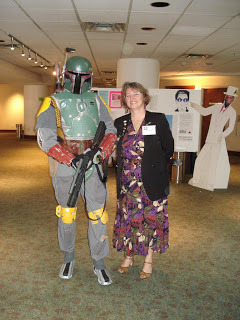
Nina meets an old friend...
I was rudely eyeballing someone’s nametag on his chest, when I collided
with the Prince George crowd that included authors, Lynda Williams (herself
responsible for some pretty nasty intergalactic wars), Nathalie Mallet (who
cages princes) and publisher Virginia O’Dine of Bundoran Press (rumored to have
been somehow responsible for the hot tub fiasco). I also chummed with Jennifer
Rahn, author of The Longevity Thesis,
who was charmed by my sly cat (she’s a softy at heart). Toulouse just kept
charming his way through the crowd right to the book fair. We wandered to the
back where Anita Hades of Edge Books gave Toulouse her usual greeting (a feline
move that was a cross between Sophie Marceau and Brigitte Helm; both she and
Toulouse have French blood coursing through their veins, after all—c’est
vrai!).
I’d come a long way from the first writer’s conference I went to as a
budding writer of a few short stories and non-fiction articles…
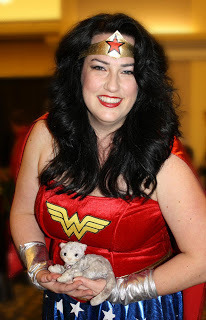
Toulouse meets all the babes...
Here’s what author Susan Denney says about her first writer’s
conference: “Going to my first writers' conference was an act of faith. I was just
starting to make some freelance sales when the members of my writers' group
encouraged me to join them at a conference a few hundred miles away. The
expense didn't seem justified to me. The cost was far more than I had earned
through writing that year. But they convinced me at last and it proved to be a
great investment. The benefits of a writers' conference are there for anyone
who has a desire to be a better writer.”
Here are some reasons why you can’t afford NOT to go to a conference or
convention:
Contacts: you will make
contacts with people working in the industry, an extremely valuable asset; this
industry is a social one, based on trust, respect and joyfulness. While there’s
no guarantee that you will meet anyone famous or influential, you will
definitely meet people who know more about writing than you do. Just hanging
out with professional writers, editors and agents is educational. If nothing
else, you will gain some confidence and ease with industry people, who are real
people too. Some may become friends; some may become colleagues; some will
become both.
Appointments: through
agent/editor/author appointments, you will have a chance to have a quality
private conversation with a professional on all aspects of writing and
publishing. This is your chance to pitch your novel or ask that one burning
question. You know you’ll get a candid and professional answer. That in itself
is invaluable and may be enough reason to attend the con. Appointments are also
your best chance of getting your manuscript read. This is because it bypasses
the slush-pile and months of waiting for a response. More and more editors and
agents look to conferences to meet potential authors. For them, meeting an author
in person is a bonus to their gauging potential success in a relationship with
them.
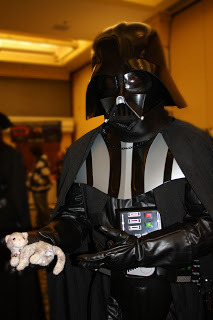
Toulouse meets an old friend...
Education on Craft
& Marketing: you will learn something about craft and marketing,
no matter what stage you are in your writing career. Depending on the
conference or convention, aside from good information from panels, you may also
get personal mentoring, 1-page critiques, or attend small themed workshops.
Feedback from an experienced writer can save you months of frustration and
grief. Just hearing about what is currently going on in the industry is also
valuable and conferences are a good way to get the skinny on what the current
issues in the writing and publishing industry are. Getting it from those who
are working inside avoids the idle and potentially harmful gossip.
Community: you will be
exposed to a community of writers, hundreds of creative people in various
stages of their careers. By interacting with both those you can help and those
who can help you, you will gain a measure of both humility and confidence and
satisfaction. We learn so much by helping others. Simply being with other
writers can help hone your people-skills, the same ones you will need when
approaching agents, editors, publishers and research sources during your career
as a professional. Remember, if you aren’t having fun, you are missing one of
the most important aspects of attending a writer’s conference, and you will
lose your own effectiveness.
Energy: there is nothing
more energizing than a common sharing among those of like-minded thought and
vision. Writing is primarily an individual pursuit, often thought to belong to
the introvert; but, to succeed in the writing/publishing industry a writer must
display staying power, persistence, confidence and enduring energy. There is
nothing quite as inspirational as hearing an accomplished writer provide their
story of victory against odds. I will never forget the moving words of Ray
Bradbury at a conference in Palm Springs years ago. I have repeated those words
many times since. If you come to a conference with the right mind-set, I
guarantee that you will leave with more energy than you came and with a burning
need to write.
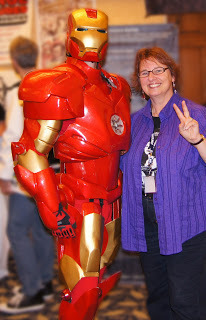
Nina meets an old friend too...
Exposure: depending on the
kind of conference or convention you attend, you will have the opportunity to
expose yourself to something different (e.g., different fiction genres and
associated communities; fiction vs. non-fiction; different media; etc.). I
attended a romance writers conference a few years back (I write mostly science
fiction and fantasy—but often with romance elements in them) and found it
bracingly educational.
New Markets &
Ideas: conferences attract writers of all kinds. Conferences provide fertile
ground for cross-pollination of ideas, markets and marketing ploys. Writers,
like you, are generally a nice crowd; most are willing and eager to share their
successes and failures. And contacts. Sharing is one of the great things that
happens at conferences. There may be a common pin board set up for people to
share. Most conferences are Twitter and Facebook enabled for quick and easy
viral sharing. If you don’t come away from a conference with at least one new
idea, contact or market, you haven’t done your job: talk to people.
Here are a few do’s and don’ts for when you go conferencing:
1.
Wear comfortable but not sloppy clothing and shoes
(it’s likely that you will be doing a fair bit of standing and walking); you
want to make a good impression. Be yourself and dress accordingly.
2.
Bring promotional material with you (e.g., business
cards, flyers on your book, stories, etc.). Have something to share and
exchange with other writers and professionals. Most conferences also have
tables devoted to shareware. This is your chance to introduce you and your
writing to others.
3.
Take something to write with (e.g., notebook and
pen or iPad, etc.).
4.
Talk to people. Chances are that everyone there is
interesting.
5.
Respect the time, particularly other people’s time,
and keep your appointments and meetings.
6.
Don’t bring your heavy manuscript with you to the
conference. Agents and editors don’t have the time or inclination or space in
their suitcase for it. Use the conference to make an impression and get an
invitation for something later in writing.
7.
Keep all of your interactions verbal and
face-to-face. Don’t rely on memorized speeches or a folded up written pitch in
your pocket. Keep it casually professional. Make eye contact and speak from the
heart. Show your passion.
8.
Have fun. And don’t be afraid to show it; there’s
nothing more infectious and attractive than someone having fun.
j
Published on October 31, 2012 16:51

